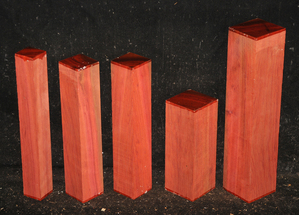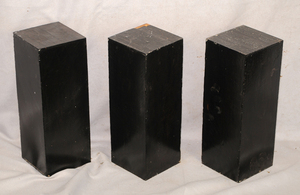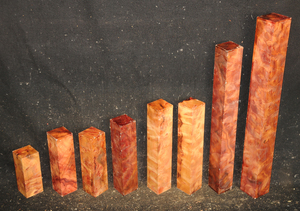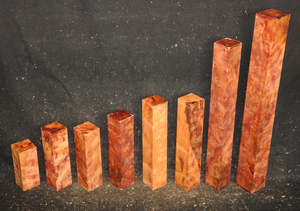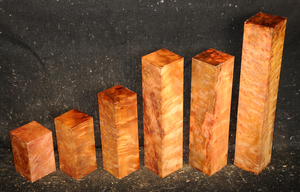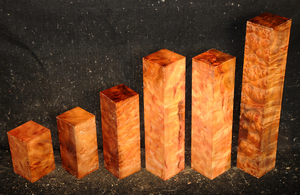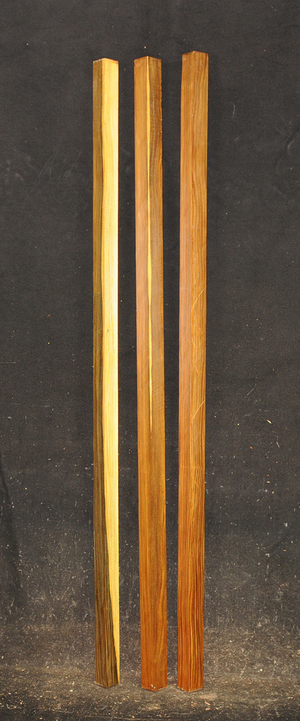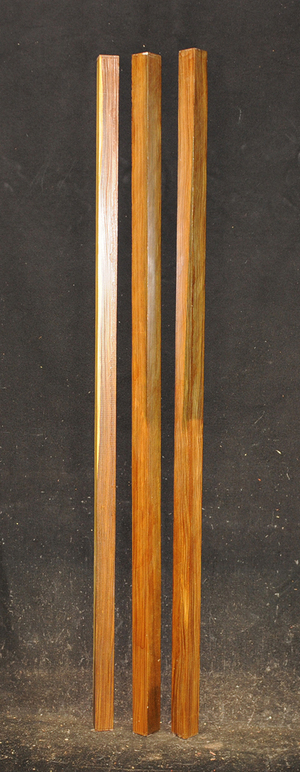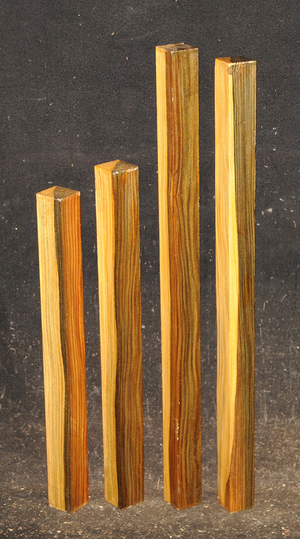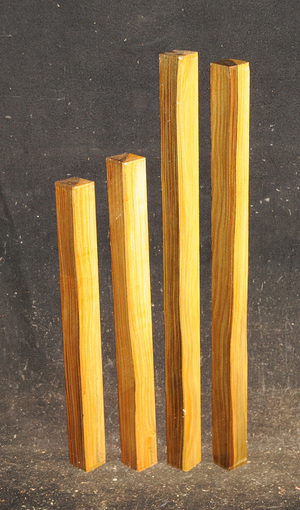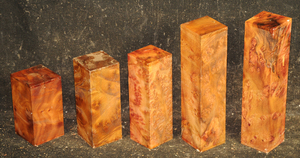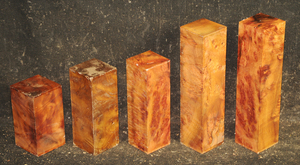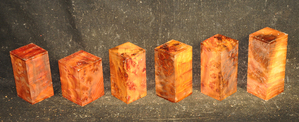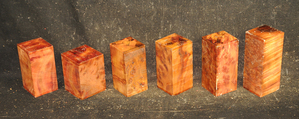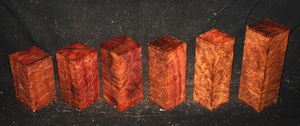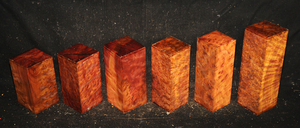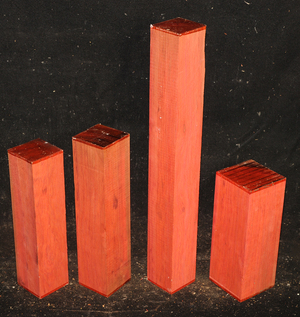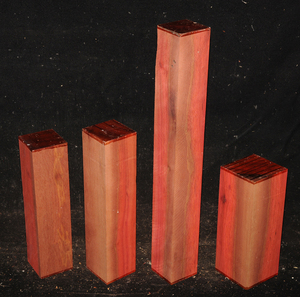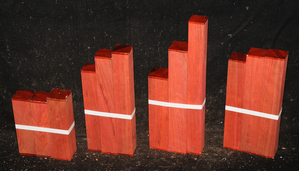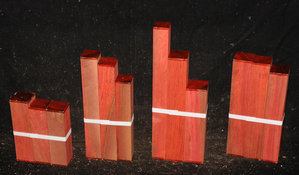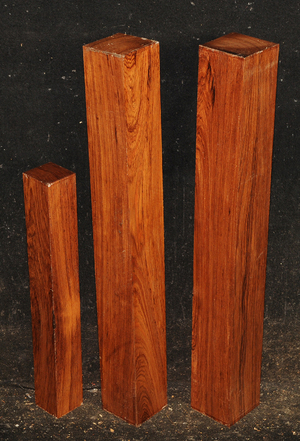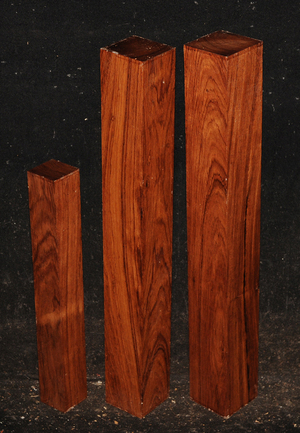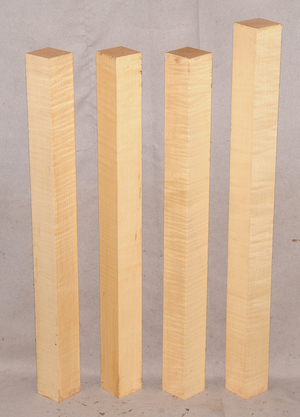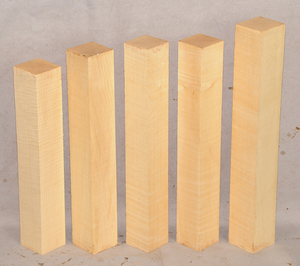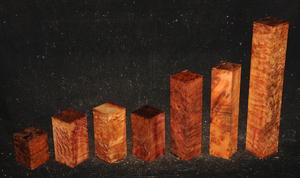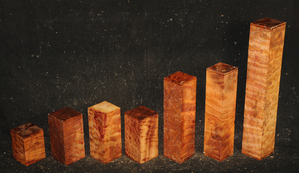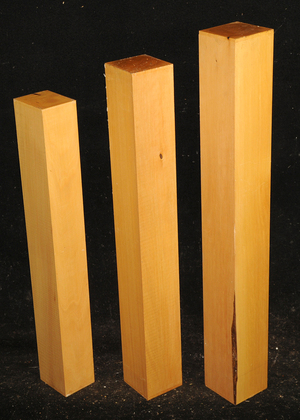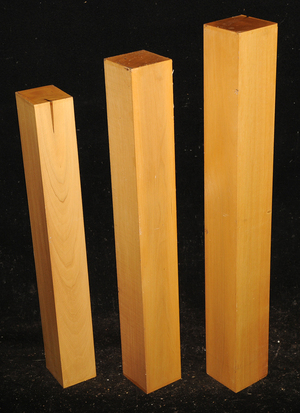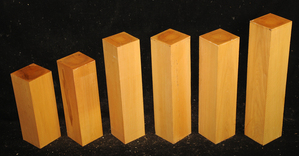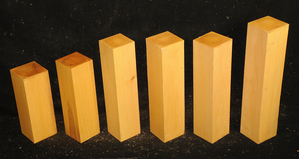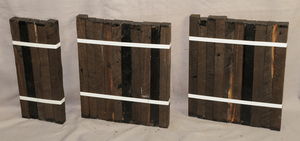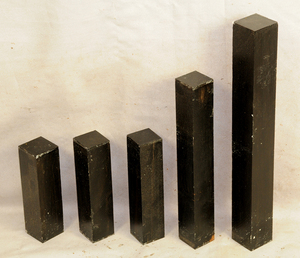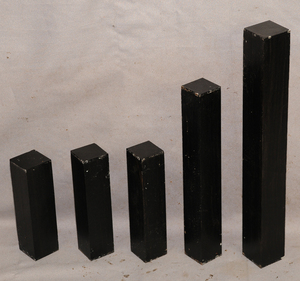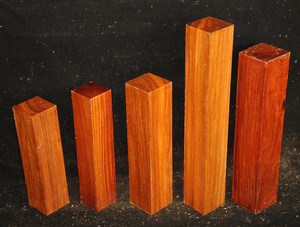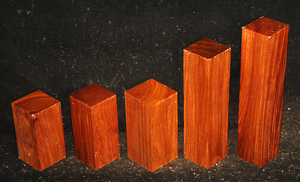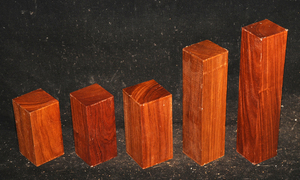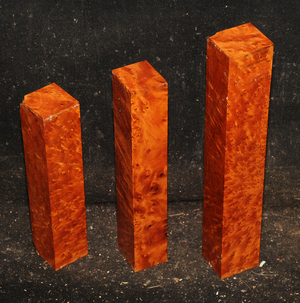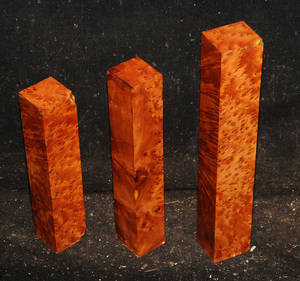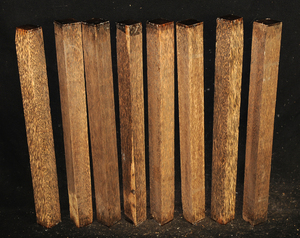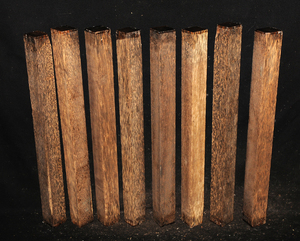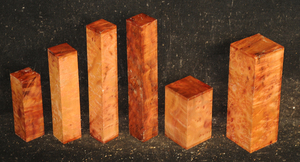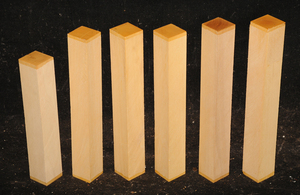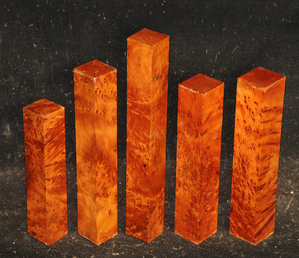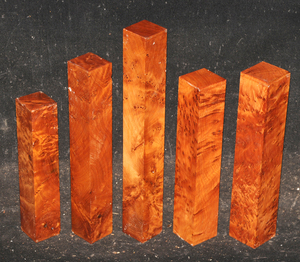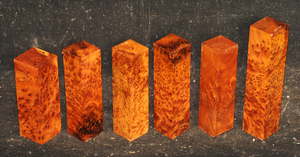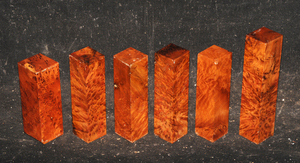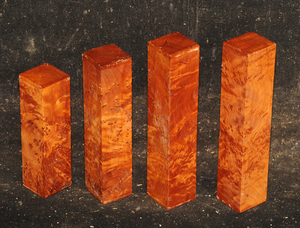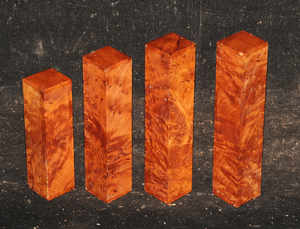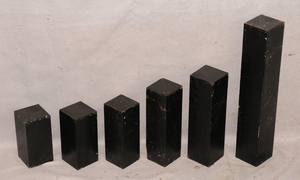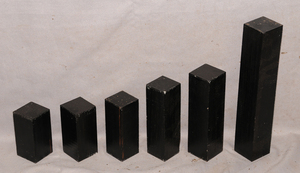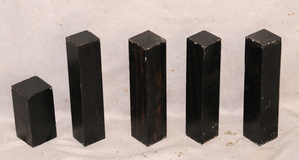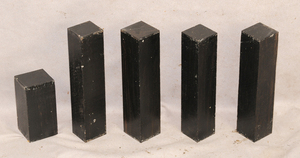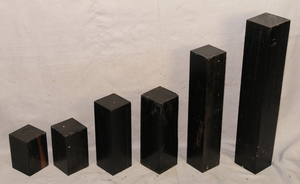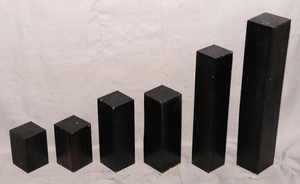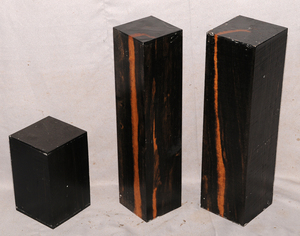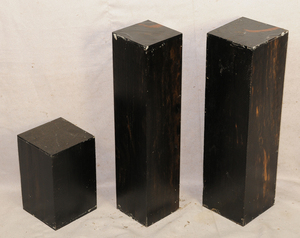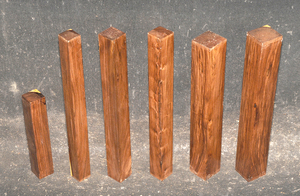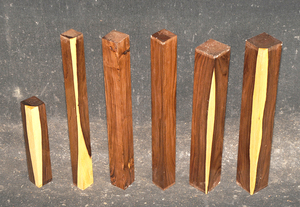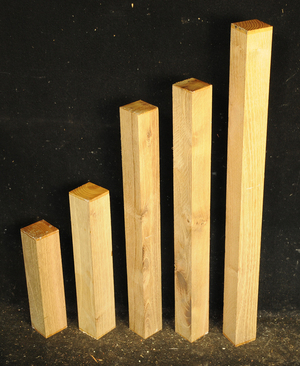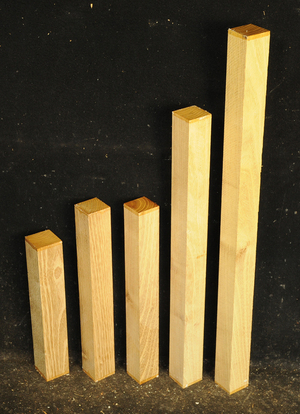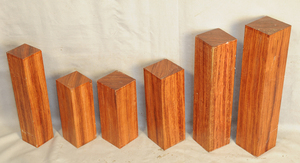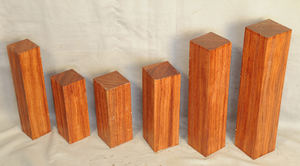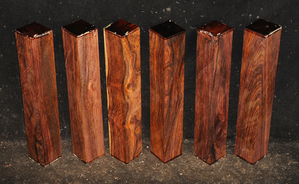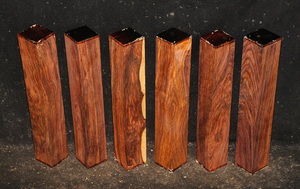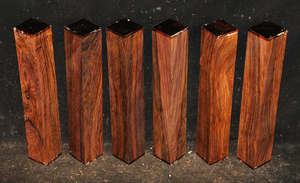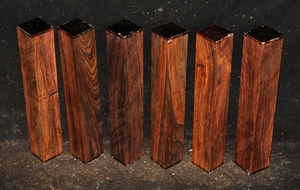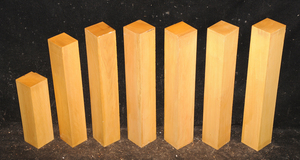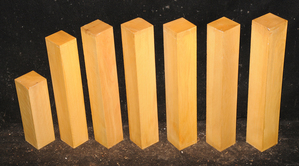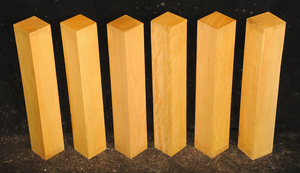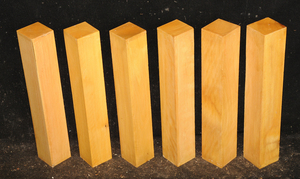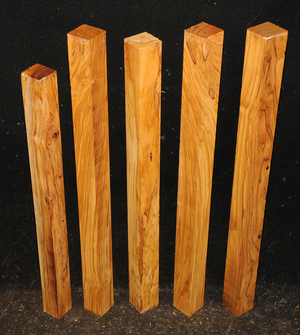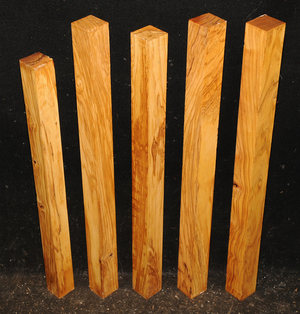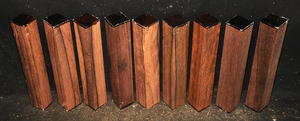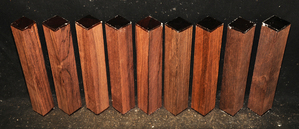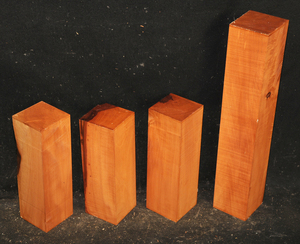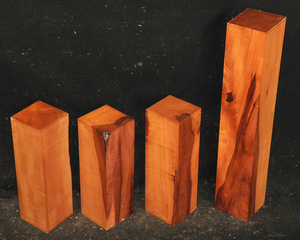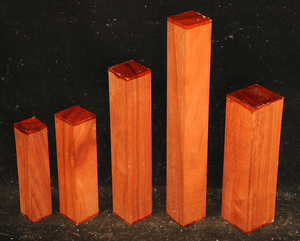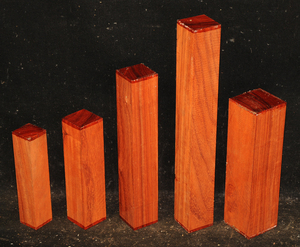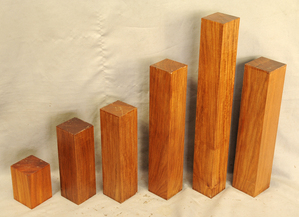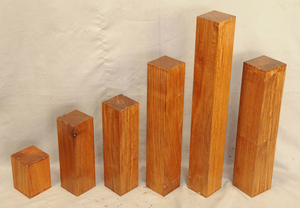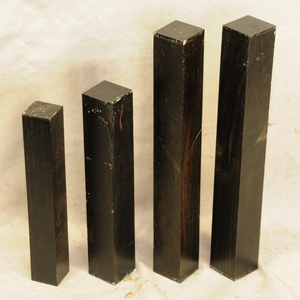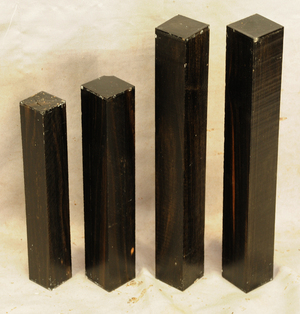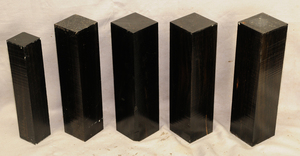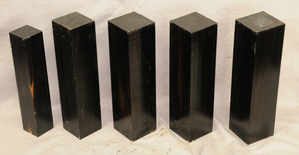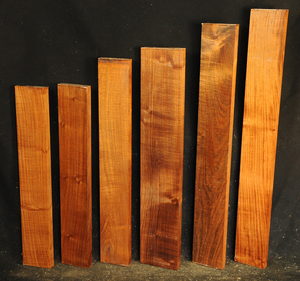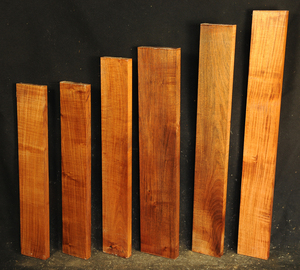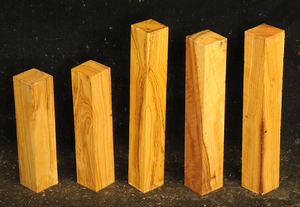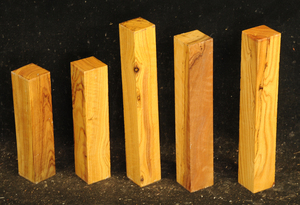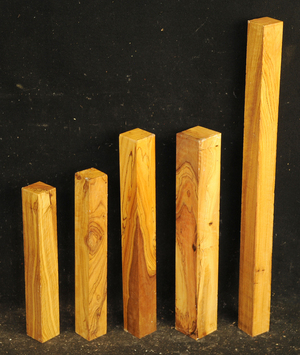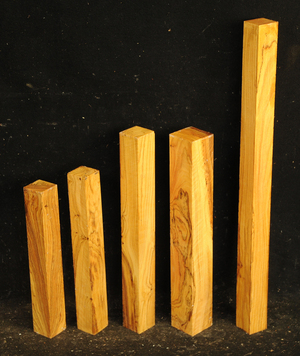Chakte-kok Turning Squares
Cosmocalyx spectabilis
This species is from the Yucatan Peninsula of Mexico. It is also called Redheart. Freshly cut it is a brilliant red color which darkens on exposure.
Item Number: W43808
African Blackwood Turning Squares
Dalbergia melanoxylon
The heartwood is purplish to brownish-black with dark gray streaks giving an overall impression of being black. Lustrous with an attractive inner chatoyance. Very hard, heavy, close-grained, and virtually free from pores. Its stability and lovely tonal qualities make it an excellent instrument wood.
Due to CITES regulations, we can only ship this species to customers in the United States.
Item Number: W43805
Camphor Burl Turning Squares
Cinnamomum sp.
This rare burl is from S.E. Asia and is seldom seen on the world market. It is fine-grained and varies in color from a light reddish-brown to almost scarlet. It is easy to work and has a very pungent, spicy scent. For a burl it is remarkably stable. Green to partially air dried.
Item Number: W43789
Camphor Burl Turning Squares
Cinnamomum sp.
This rare burl is from S.E. Asia and is seldom seen on the world market. It is fine-grained and varies in color from a light reddish-brown to almost scarlet. It is easy to work and has a very pungent, spicy scent. For a burl it is remarkably stable. Green to partially air dried.
Item Number: W43788
Lignum Vitae Cane Blanks
Guaiacum sanctum
One of the world's densest and oiliest woods. The green to greenish-brown heartwood weighs between 80 to 90 lbs/cubic foot. Long used for its self-lubricating qualities in marine applications such as propeller shaft and rudder shaft bearings, it is also thought to have medicinal and healing properties. Its oily nature makes it difficult to glue but makes it a fantastic turning wood.
Any Lignum Vitae on our site is genuine Lignum, not Verawood. We also have Verawood in stock and will be labeled as such on the website.
Due to CITES regulations, we can only ship this species to customers in the United States.
Item Number: W43785
Lignum Vitae Turning Squares
Guaiacum sanctum
One of the world's densest and oiliest woods. The green to greenish-brown heartwood weighs between 80 to 90 lbs/cubic foot. Long used for its self-lubricating qualities in marine applications such as propeller shaft and rudder shaft bearings, it is also thought to have medicinal and healing properties. Its oily nature makes it difficult to glue but makes it a fantastic turning wood.
Any Lignum Vitae on our site is genuine Lignum, not Verawood. We also have Verawood in stock and will be labeled as such on the website.
Due to CITES regulations, we can only ship this species to customers in the United States.
Item Number: W43784
Camphor Burl Turning Squares
Cinnamomum sp.
This rare burl is from S.E. Asia and is seldom seen on the world market. It is fine-grained and varies in color from a light reddish-brown to almost scarlet. It is easy to work and has a very pungent, spicy scent. For a burl it is remarkably stable. Green to partially air dried.
Item Number: W43779
Camphor Burl Turning Squares
Cinnamomum sp.
This rare burl is from S.E. Asia and is seldom seen on the world market. It is fine-grained and varies in color from a light reddish-brown to almost scarlet. It is easy to work and has a very pungent, spicy scent. For a burl it is remarkably stable. Green to partially air dried.
Item Number: W43778
Camphor Burl Turning Squares
Cinnamomum sp.
This rare burl is from S.E. Asia and is seldom seen on the world market. It is fine-grained and varies in color from a light reddish-brown to almost scarlet. It is easy to work and has a very pungent, spicy scent. For a burl it is remarkably stable. Green to partially air dried.
Item Number: W43771
Chakte-kok Turning Squares
Cosmocalyx spectabilis
This species is from the Yucatan Peninsula of Mexico. It is also called Redheart. Freshly cut it is a brilliant red color which darkens on exposure.
Item Number: W43761
Chakte-kok Turning Square Bundles
Cosmocalyx spectabilis
This species is from the Yucatan Peninsula of Mexico. It is also called Redheart. Freshly cut it is a brilliant red color which darkens on exposure.
Each bundle has 3 pieces.
Item Number: W43760
Honduras Rosewood Turning Squares
Dalbergia stevensonii
A true rosewood, most of our stock comes from Belize. Smelling like stored apples, it is a lovely wood to turn and takes a fantastic polish. Getting scarce on the world market.
Due to CITES regulations, we can only ship this species to customers in the United States.
Item Number: W43757
Curly European Sycamore Turning Squares
Acer pseudoplatanus
This European Maple is native to central Europe and west Asia. It is a tough, white or cream colored, fine-grained timber. It reminds me of vanilla ice cream because it is so even-colored. It works well in any grain direction. It is used for musical instruments, furniture, cabinetry, and because it is non-staining it is used for kitchen utensils, wooden spoons, rolling pins, and cutting boards. The figure is fiddleback on the quartersawn surface and more of a broken curl on the flatsawn surface. Select, quartersawn material is used for violin backs and sides and necks. Dry.
Item Number: W43741
Curly European Sycamore Turning Squares
Acer pseudoplatanus
This European Maple is native to central Europe and west Asia. It is a tough, white or cream colored, fine-grained timber. It reminds me of vanilla ice cream because it is so even-colored. It works well in any grain direction. It is used for musical instruments, furniture, cabinetry, and because it is non-staining it is used for kitchen utensils, wooden spoons, rolling pins, and cutting boards. The figure is fiddleback on the quartersawn surface and more of a broken curl on the flatsawn surface. Select, quartersawn material is used for violin backs and sides and necks. Dry.
Item Number: W43740
Camphor Burl Turning Squares
Cinnamomum sp.
This rare burl is from S.E. Asia and is seldom seen on the world market. It is fine-grained and varies in color from a light reddish-brown to almost scarlet. It is easy to work and has a very pungent, spicy scent. For a burl it is remarkably stable. Green to partially air dried.
Item Number: W43718
Castello Boxwood
Calycophyllum multiflorum
Castello Boxwood, though not a true Buxus species, still has a very fine texture and a lovely light canary yellow color. This is truly a dream wood to mill.It is an excellent turnery wood, capable of very fine detail. Also very popular for making scale timbers and other parts for model ships. Air-dried.
Item Number: W43683
Castello Boxwood Turning Squares
Calycophyllum multiflorum
Castello Boxwood, though not a true Buxus species, still has a very fine texture and a lovely light canary yellow color. This is truly a dream wood to mill.It is an excellent turnery wood, capable of very fine detail. Also very popular for making scale timbers and other parts for model ships. Air-dried.
Item Number: W43682
Malagasy Ebony Turning Squares Bundles
Diospyros perreiri
This Ebony is unsurpassed for its beauty and blackness. It is fairly fine-textured and takes a high polish. Finest ebony in the world. Rare.
This species is on the CITES list and as a consequence, we are limiting sales to the United States only.
A has 5 pieces
B & C has 10 pieces each.
Item Number: W43675
West African Ebony Turning Squares
Diospyros crassiflora
Sometimes called Gabon or Gaboon, this Ebony is sometimes jet black but oftentimes has grayish streaks that mostly disappear when finished or after the made object has been put into service. This Ebony has a marked resistance to checking that is characteristic of some of the Indian and Asian species. It has a wonderful texture and is easily carved, planed, turned, and milled. It is fairly fine-grained and takes a high polish. This Ebony usually originates in either Cameroon or Nigeria and the logs are rough hewn in the forest and oftentimes brought to the nearest road by human porters. With the disappearance of other species of black Ebony this species is fast becoming the Ebony of choice.
Item Number: W43673
Narra Turning Squares
Pterocarpus indicus
Also called New Guinea Rosewood. It is a beautiful, highly lustrous golden yellow color sometimes with reddish streaks. A nice turning wood it is also used in furniture, jewelry boxes, handles, etc. It is easy to work and glue and takes a nice polish.
Item Number: W43668
Narra Turning Squares
Pterocarpus indicus
Also called New Guinea Rosewood. It is a beautiful, highly lustrous golden yellow color sometimes with reddish streaks. A nice turning wood it is also used in furniture, jewelry boxes, handles, etc. It is easy to work and glue and takes a nice polish.
Item Number: W43667
Thuya Burl
Tetraclinis articulata
This comes from the Atlas mountains in Morocco and has a beautiful golden chatoyance. Its color varies from a rich, lustrous golden brown to nearly black. Thuya burl is hard and dense with a high oil content, but tends to be brittle. The eyes, perfectly round, are scattered about in some burls like the figure in bird's-eye maple; in others they are grouped as islands. Due to it's desert occurrence, the wood sometimes contains small defects or inclusions but most can be repaired with cyanoacrylate (super) glues. A rare species, this exquisite wood is used for inlays, small boxes, turnery, and precious objects.
Item Number: W43664
Black Palm Turning Squares
Astrocaryum & Borassus sp.
These are large palms, often up to 70 or 80 feet tall found in Asia, Central America and West Africa. When first felled they are often split into long beams and are used locally for canoes and drums. The wood, especially in older trees, is very hard and durable and consists of numerous fine, black fibers crowded densely together and surrounded by lighter colored, less dense material. The end grain gives the effect of lizard or snake skin. The densest wood is found on the outside of the trees and gets progressively softer towards the middle. Locally it is used for roof beams, bridges, and telephone poles, and is resistant to salt water, termites, and fungi. It takes a fine polish and is used for walking sticks, decorative handles, and boxes.
Item Number: W43660
Camphor Burl Turning Squares
Cinnamomum sp.
This rare burl is from S.E. Asia and is seldom seen on the world market. It is fine-grained and varies in color from a light reddish-brown to almost scarlet. It is easy to work and has a very pungent, spicy scent. For a burl it is remarkably stable. Green to partially air dried.
Item Number: W43652
Castello Boxwood Turning Squares
Calycophyllum multiflorum
Castello Boxwood, though not a true Buxus species, still has a very fine texture and a lovely light canary yellow color. This is truly a dream wood to mill.It is an excellent turnery wood, capable of very fine detail. Also very popular for making scale timbers and other parts for model ships. Air-dried.
None of these pieces have any figure to them, so they would be perfect for model ship parts.
Item Number: W43636
Thuya Burl Turning Squares
Tetraclinis articulata
This comes from the Atlas mountains in Morocco and has a beautiful golden chatoyance. Its color varies from a rich, lustrous golden brown to nearly black. Thuya burl is hard and dense with a high oil content, but tends to be brittle. The eyes, perfectly round, are scattered about in some burls like the figure in bird's-eye maple; in others they are grouped as islands. Due to it's desert occurrence, the wood sometimes contains small defects or inclusions but most can be repaired with cyanoacrylate (super) glues. A rare species, this exquisite wood is used for inlays, small boxes, turnery, and precious objects.
Item Number: W43634
Thuya Burl Turning Squares
Tetraclinis articulata
This comes from the Atlas mountains in Morocco and has a beautiful golden chatoyance. Its color varies from a rich, lustrous golden brown to nearly black. Thuya burl is hard and dense with a high oil content, but tends to be brittle. The eyes, perfectly round, are scattered about in some burls like the figure in bird's-eye maple; in others they are grouped as islands. Due to it's desert occurrence, the wood sometimes contains small defects or inclusions but most can be repaired with cyanoacrylate (super) glues. A rare species, this exquisite wood is used for inlays, small boxes, turnery, and precious objects.
Item Number: W43633
Thuya Burl Turning Squares
Tetraclinis articulata
This comes from the Atlas mountains in Morocco and has a beautiful golden chatoyance. Its color varies from a rich, lustrous golden brown to nearly black. Thuya burl is hard and dense with a high oil content, but tends to be brittle. The eyes, perfectly round, are scattered about in some burls like the figure in bird's-eye maple; in others they are grouped as islands. Due to it's desert occurrence, the wood sometimes contains small defects or inclusions but most can be repaired with cyanoacrylate (super) glues. A rare species, this exquisite wood is used for inlays, small boxes, turnery, and precious objects.
Item Number: W43632
West African Ebony Turning Squares
Diospyros crassiflora
Sometimes called Gabon or Gaboon, this Ebony is sometimes jet black but oftentimes has grayish streaks that mostly disappear when finished or after the made object has been put into service. This Ebony has a marked resistance to checking that is characteristic of some of the Indian and Asian species. It has a wonderful texture and is easily carved, planed, turned, and milled. It is fairly fine-grained and takes a high polish. This Ebony usually originates in either Cameroon or Nigeria and the logs are rough hewn in the forest and oftentimes brought to the nearest road by human porters. With the disappearance of other species of black Ebony this species is fast becoming the Ebony of choice.
Item Number: W43627
West African Ebony Turning Squares
Diospyros crassiflora
Sometimes called Gabon or Gaboon, this Ebony is sometimes jet black but oftentimes has grayish streaks that mostly disappear when finished or after the made object has been put into service. This Ebony has a marked resistance to checking that is characteristic of some of the Indian and Asian species. It has a wonderful texture and is easily carved, planed, turned, and milled. It is fairly fine-grained and takes a high polish. This Ebony usually originates in either Cameroon or Nigeria and the logs are rough hewn in the forest and oftentimes brought to the nearest road by human porters. With the disappearance of other species of black Ebony this species is fast becoming the Ebony of choice.
Item Number: W43625
West African Ebony Turning Squares
Diospyros crassiflora
Sometimes called Gabon or Gaboon, this Ebony is sometimes jet black but oftentimes has grayish streaks that mostly disappear when finished or after the made object has been put into service. This Ebony has a marked resistance to checking that is characteristic of some of the Indian and Asian species. It has a wonderful texture and is easily carved, planed, turned, and milled. It is fairly fine-grained and takes a high polish. This Ebony usually originates in either Cameroon or Nigeria and the logs are rough hewn in the forest and oftentimes brought to the nearest road by human porters. With the disappearance of other species of black Ebony this species is fast becoming the Ebony of choice.
Item Number: W43614
West African Ebony Turning Squares
Diospyros crassiflora
Sometimes called Gabon or Gaboon, this Ebony is sometimes jet black but oftentimes has grayish streaks that mostly disappear when finished or after the made object has been put into service. This Ebony has a marked resistance to checking that is characteristic of some of the Indian and Asian species. It has a wonderful texture and is easily carved, planed, turned, and milled. It is fairly fine-grained and takes a high polish. This Ebony usually originates in either Cameroon or Nigeria and the logs are rough hewn in the forest and oftentimes brought to the nearest road by human porters. With the disappearance of other species of black Ebony this species is fast becoming the Ebony of choice.
Item Number: W43613
Cocuswood Turning Squares
Brya ebenus
This extremely rare species is found in Cuba, Jamaica, and the Dominican Republic. Also called Green, Brown, or West Indian Ebony. The heartwood is brownish-yellow to dark brown often with a greenish tinge. It is usually beautifully veined with darker streaks. The wood is hard and heavy weighing 68 to 80 lbs/cubic foot. This high density contributes to its wonderful acoustic properties-it fairly rings when struck. It is well known for its use in woodwinds such as flutes, piccolos, and bagpipes because of its fine and uniform grain, its beautiful coloring and its resonance.
C the actual length is 12 but we tallied it at 8 3/8 because of slight defects on one end.
F has a small defect on 2 corners that looks to go through the middle of the square.. You will for sure get 2 pieces that are clear that are 4 1/4" and 6 1/2" long. The actual length is 11 11/16". Priced according to the clear sections.
Item Number: W43609
Black Locust Turning Squares
Item Number: W43598
Black Locust Turning Squares
Item Number: W43597
Bubinga Turning Squares
Guibourtia tessmannii
Called by some woodworkers African Rosewood, Bubinga is a deep, lustrous, brownish-red color with a fine, darker striping. The figure makes the wood doubly beautiful. It is very hard and heavy and takes a glassy, smooth finish.
Due to CITES regulations, we can only ship this species to customers in the United States.
Item Number: W43596
Mexican Cocobolo Turning Squares
Dalbergia retusa
The wood is very oily which makes it difficult to glue but on the plus side the oiliness makes it easy to produce a fantastic polish on finished pieces. Wear a respirator mask when working Cocobolo as the dust can produce asthma-like reactions. Cocobolo is a small to medium sized tree and is found mainly in Mexico, Costa Rica, Nicaragua, and Panama.
Due to CITES regulations, we can only ship this species to customers in the United States.
Item Number: W43592
Mexican Cocobolo Turning Squares
Dalbergia retusa
The wood is very oily which makes it difficult to glue but on the plus side the oiliness makes it easy to produce a fantastic polish on finished pieces. Wear a respirator mask when working Cocobolo as the dust can produce asthma-like reactions. Cocobolo is a small to medium sized tree and is found mainly in Mexico, Costa Rica, Nicaragua, and Panama.
Due to CITES regulations, we can only ship this species to customers in the United States.
Item Number: W43591
Castello Boxwood Turning Squares
Calycophyllum multiflorum
Castello Boxwood, though not a true Buxus species, still has a very fine texture and a lovely light canary yellow color. This is truly a dream wood to mill.It is an excellent turnery wood, capable of very fine detail. Also very popular for making scale timbers and other parts for model ships. Air-dried.
Item Number: W43590
Castello Boxwood Turning Squares
Calycophyllum multiflorum
Castello Boxwood, though not a true Buxus species, still has a very fine texture and a lovely light canary yellow color. This is truly a dream wood to mill.It is an excellent turnery wood, capable of very fine detail. Also very popular for making scale timbers and other parts for model ships. Air-dried.
Item Number: W43589
Mediterranean Olivewood Turning Squares
Olea europa
A wood of biblical importance, no wood is more closely associated with history and the development of civilization than Olivewood. A beautifully variegated timber. Partially air-dried.
A has some small, loose knots.
Item Number: W43574
Palisander Turning Squares
Dalbergia baronii
One of several rosewood species from Madagascar. It has beautiful color and grain, a sweet smell, and is very easy to work and stable in use. It is a very close match to true Rio or Brazilian Rosewood (Dalbergia nigra) and as such is much in demand for musical instruments, especially guitars.
Due to this item being on the CITES list, we are only shipping this species to addresses in the United States.
Item Number: W43573
European Pearwood Turning Squares
Pyrus communis
Almost all Pearwood imported into the U.S.A. has been steamed to bring out a more pinkish-red color and to prevent drying stresses. Formerly the wood was used for carving, turning, drawing instruments, wood engravings, textile printing blocks, and tool handles. Stained black it is an excellent substitute for Ebony. Contemporary uses include woodwinds such as recorders, furniture, kitchen accessories, jewelry and other boxes, and architectural uses such as paneling and doors.
Item Number: W43563
Padouk Turning Squares
Pterocarpus soyauxii
This brick-red colored West African hardwood was once one of the more common imported hardwoods but has become increasingly scarce in the last couple of years. It is easy to work, takes a nice polish and is dimensionally stable.
Item Number: W43546
Narra Turning Squares
Pterocarpus indicus
Also called New Guinea Rosewood. It is a beautiful, highly lustrous golden yellow color sometimes with reddish streaks. A nice turning wood it is also used in furniture, jewelry boxes, handles, etc. It is easy to work and glue and takes a nice polish.
Item Number: W43544
West African Ebony Turning Squares
Diospyros crassiflora
Sometimes called Gabon or Gaboon, this Ebony is sometimes jet black but oftentimes has grayish streaks that mostly disappear when finished or after the made object has been put into service. This Ebony has a marked resistance to checking that is characteristic of some of the Indian and Asian species. It has a wonderful texture and is easily carved, planed, turned, and milled. It is fairly fine-grained and takes a high polish. This Ebony usually originates in either Cameroon or Nigeria and the logs are rough hewn in the forest and oftentimes brought to the nearest road by human porters. With the disappearance of other species of black Ebony this species is fast becoming the Ebony of choice.
Item Number: W43537
West African Ebony Turning Squares
Diospyros crassiflora
Sometimes called Gabon or Gaboon, this Ebony is sometimes jet black but oftentimes has grayish streaks that mostly disappear when finished or after the made object has been put into service. This Ebony has a marked resistance to checking that is characteristic of some of the Indian and Asian species. It has a wonderful texture and is easily carved, planed, turned, and milled. It is fairly fine-grained and takes a high polish. This Ebony usually originates in either Cameroon or Nigeria and the logs are rough hewn in the forest and oftentimes brought to the nearest road by human porters. With the disappearance of other species of black Ebony this species is fast becoming the Ebony of choice.
Item Number: W43536
Figured Black Mesquite
Prosopis nigra
A very few pieces of Mesquite are figured with what we call frog's-hair curl, a small, tight curl with as many as 12-15 curls per inch. A very stable wood. Air-dried.
Item Number: W43518
African Wild Olivewood Turning Squares
Olea macrocarpa
A species of Olive from South Africa. Very rarely seen on the commercial timber market. It is similar in color to the European species but is denser and harder with more variegations of color and grain. Partially air-dried.
Item Number: W43509
African Wild Olivewood Turning Squares
Olea macrocarpa
A species of Olive from South Africa. Very rarely seen on the commercial timber market. It is similar in color to the European species but is denser and harder with more variegations of color and grain. Partially air-dried.
Item Number: W43508

